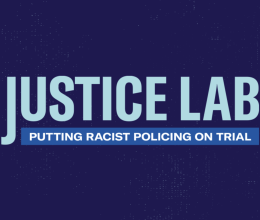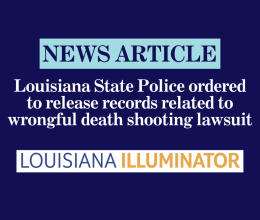BATON ROUGE — The Louisiana State Police must produce documents surrounding the death of Mr. Jabari Asante-Chioke, a 52‑year‑old Black man killed by police in 2021, as well as any records of policing procedures relating to people experiencing mental health crises. The Louisiana State Police was ordered by the 19th Judicial District Court to do so after the ACLU of Louisiana and White & Case successfully petitioned the Court for a writ of mandamus to produce public records that were requested by Mr. Asante-Chioke’s daughter, Ms. Malikah Asante-Chioke. As well, Ms. Asante-Chioke was awarded attorney’s fees.
In addition to this public records law case, Ms. Asante-Chioke is being represented, on a pro bono basis, by the ACLU of Louisiana and White & Case in the Justice Lab case Asante-Chioke v. Dowdle on federal claims for excessive force. That case arises from the police killing of Ms. Asante-Chioke’s father when he was experiencing a mental‑health crisis. Officers from the Louisiana State Police and East Jefferson Levee District Police Department shot Mr. Asante-Chioke 36 times, and continued to shoot his lifeless body even after he fell to the ground.
On May 31, 2024, Ms. Asante-Chioke submitted nine public records requests to the Louisiana State Police. The requests pertained to her father’s shooting, the personnel records of officers involved, and any training materials relating to de-escalation and interacting with people experiencing mental health issues.
The Louisiana State Police denied each request, citing an exception under the law for records involving foreseeable criminal litigation. After multiple efforts by Ms. Asante-Chioke to clarify whether this exception applied to each request, the ACLU of Louisiana and White & Case filed a petition for writ of mandamus under Louisiana’s Public Records Law on August 22, 2024.
On September 23, 2024, after a summary proceeding held in the 19th Judicial District Court, the Court granted Ms. Asante-Chioke’s petition in full, ordering the Louisiana State Police to produce all documents responsive to Ms. Asante-Chioke’s request within 45 days. Under Louisiana’s Public Records Law provisions for prevailing parties, Ms. Asante-Chioke was also awarded attorney’s fees.
“This is a victory for Malikah, and for the rights of all Louisianans,” said Nora Ahmed, Legal Director for the ACLU of Louisiana. “The law is clear: members of the public have the right to access public records, a right that is guaranteed by our state constitution and by our Public Records Law. That right must be respected.”
“The Louisiana State Police stonewalled us for months, refusing to produce plainly public documents to Ms. Malikah Asante-Chioke, a Louisiana citizen, regarding the circumstances of the killing of her father and how officers are trained to interact with citizens,” said Dana Foster partner at White & Case and pro bono counsel to Ms. Asante-Chioke. “We are pleased that the court followed the law and justice prevailed.”







